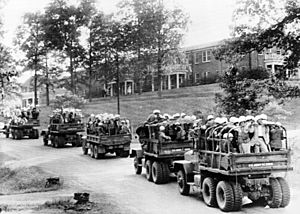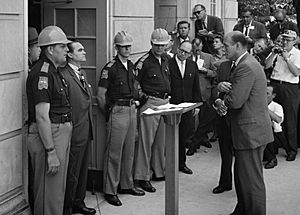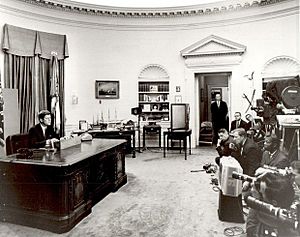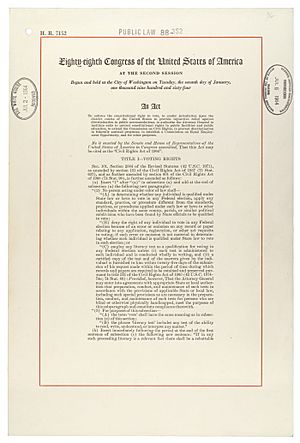Report to the American People on Civil Rights facts for kids
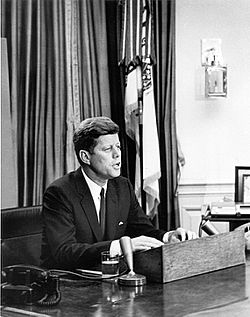
President Kennedy delivering his speech while sitting at the Resolute desk in the Oval Office
|
|
| Date | June 11, 1963 |
|---|---|
| Time | 8:00–8:13 PM EDT |
| Duration | 13:24 |
| Venue | Oval Office, White House |
| Location | Washington, D.C., United States |
| Theme | Civil rights |
| Website | Report to the American People on Civil Rights, 11 June 1963 |
The Report to the American People on Civil Rights was a very important speech. It was given by United States President John F. Kennedy on radio and television. He spoke from the Oval Office on June 11, 1963. In this speech, he suggested new laws that would later become the Civil Rights Act of 1964.
Kennedy explained that civil rights were a moral issue, not just a legal one. This meant he believed everyone should be treated fairly because it was the right thing to do. This speech showed a big change in his government's support for the Civil Rights Movement. It also became a key part of his history as a leader who fought for equal rights.
At first, President Kennedy was careful about supporting civil rights. He worried that strong actions might upset lawmakers in the southern states, where segregation was common. Segregation meant that Black and white people were kept separate in many places. So, he mostly focused on legal reasons for his actions. But as time went on, Black Americans became more impatient. They wanted faster progress. Tensions grew, and the civil rights movement became stronger. This situation worried many white Americans. It also made the United States look bad to other countries. Kennedy realized he needed to do more. He decided to support new laws that would end segregation in public places.
On June 11, 1963, federal officials helped two Black students enter the University of Alabama. Kennedy felt this was the right time to speak about civil rights. He asked his speechwriter, Ted Sorensen, to quickly write a speech for him to give on television that evening.
Contents
Why the Speech Was Needed
When President John F. Kennedy first became president, he didn't talk much about civil rights for Black Americans. He preferred to use his power as president rather than pass new laws. He was careful not to upset the South, where there was a lot of segregation and unfair treatment based on race. He also didn't want to anger members of Congress. He was already trying to get their support for his other plans.
However, Kennedy's views on civil rights began to change in 1961. This was during the Freedom Rides. During these rides, Black Americans traveled on segregated bus routes in the South. Even though he sent federal officers to stop violence, he said his actions were about upholding the law. He argued that all Americans had a right to travel freely. Still, many activists wanted him to talk about the "moral issue" of civil rights. An aide named Harris Wofford told Kennedy that people felt he needed to show moral leadership during this crisis.
In 1962, Kennedy spoke about civil rights in his State of the Union Address. But he still focused on legal reasons. He said that existing laws were enough. In September, James Meredith, a Black man, enrolled at the University of Mississippi. Kennedy used federal troops to protect Meredith. But he played down the violence that happened. He also didn't change his plans for new laws. Civil rights leader Martin Luther King Jr. was disappointed. Many activists felt Kennedy cared more about calming the movement than ending unfair practices.
By 1963, more white Americans were worried that the civil rights movement might become violent. This was partly because of new, more forceful Black leaders like Malcolm X. Also, news reports of racial violence made the United States look bad during the Cold War. This worried Kennedy a lot. He decided that new laws would help solve the problem in courts. This would keep the protests "out of the streets" and away from international attention.
In February, Kennedy received a report about racial discrimination. He then asked Congress to pass a civil rights bill. He said that institutional racism was wrong. This was the first time Kennedy talked about civil rights as a moral issue. But the bill didn't get much support. Civil rights leaders felt it wasn't strong enough. So, the Southern Christian Leadership Conference organized protests in Birmingham, Alabama, in April. They wanted to create a crisis that would force the President to act. The violent response to these protests in May upset Kennedy. But he didn't step in directly because he felt he didn't have a legal reason. The conflict in Birmingham got attention from all over the world.
After a bombing at Martin Luther King's house on May 12, Kennedy gave a short radio and TV speech. He promised to keep order and uphold the law. Meanwhile, some politicians in Congress suggested laws to end segregation. Kennedy realized he had to act. His brother, Attorney General Robert F. Kennedy, also felt strongly that new laws were needed. On May 22, the President said he was thinking about new proposals for Congress. Nine days later, he decided to propose a new civil rights bill.
Leading Up to the Speech
On May 21, 1963, a judge ruled that the University of Alabama had to allow two Black students, James Hood and Vivian Malone, to enroll. Alabama Governor George Wallace was determined to publicly oppose this order.
Kennedy and his staff discussed whether he should give a speech. Kennedy wasn't sure, and most of his senior advisors were against it. Only his brother, Robert Kennedy, supported the idea. On June 3, Vice President Lyndon B. Johnson told Kennedy's speechwriter that civil rights leaders wanted a "moral commitment." He said Kennedy should speak about the moral issue clearly. He even suggested Kennedy appear on TV with military members of different races. He thought Kennedy could argue that if people served equally in the military, they should be treated equally at home.
On June 11, Governor Wallace stood in the doorway of a building at the University of Alabama. He tried to stop the Black students from registering. Around noon, Kennedy asked the major TV networks (ABC, CBS, NBC) to clear time for him to speak at 8:00 p.m. Less than three hours later, Governor Wallace stepped aside. Kennedy and his staff watched this happen on TV.
Sorensen thought that since the problem was solved, Kennedy wouldn't give the speech. But Kennedy felt it was a good chance to teach the public about civil rights. He also wanted to follow through with new laws. He told Sorensen, "We better give that civil rights speech tonight." Some advisors disagreed, fearing it would anger people in the South. But Robert Kennedy strongly pushed for the speech. Historians believe Kennedy also wanted to show he was a strong leader.
With only about two hours before the broadcast, no speech was ready. Kennedy told Sorensen what he wanted to say. Sorensen and others, including Robert Kennedy, worked quickly in the Cabinet Room. Sorensen was worried about the deadline. Robert Kennedy assured him they had good material from the Justice Department.
Around 7:00 p.m., President Kennedy checked on their progress. Sorensen had two unfinished drafts. Kennedy also changed some parts of the speech. He wanted to avoid upsetting Southerners too much. For example, he changed "A social revolution is at hand" to "A great change is at hand." Four minutes before 8:00 p.m., Sorensen gave Kennedy a draft. Kennedy quickly made final changes. They barely finished before the broadcast.
What the Speech Said
Kennedy read most of his speech from notes on his desk. An American flag was behind him. He spoke for about 13 minutes.
He started by talking about the integration of the University of Alabama. He said he sent the National Guard to make sure a court order was followed. He used the word "Alabama" several times to show it was a state issue that the federal government had to step in to solve. He also praised the students for being peaceful.
Then, Kennedy connected his message to basic American ideas:
This nation was founded by men of many nations and backgrounds. It was founded on the principle that all men are created equal and that the rights of every man are diminished when the rights of one man are threatened.
Kennedy then looked at the issue from a global view. He pointed out that the United States military had nonwhite soldiers serving abroad. He said that because they were expected to serve equally, they deserved equal treatment at home. He asked, "Are we to say to the world... that this is the land of the free except for the Negroes?"
Kennedy was careful not to blame only the South. He said, "This is not a sectional issue. Difficulties over segregation and discrimination exist in every city, in every State of the Union."
In his speech, Kennedy asked Americans to see civil rights as a moral cause. He said everyone needed to help. He explained how the new laws would help end discrimination and provide equal treatment for all Black Americans.
Kennedy read most of the speech as it was written. But he changed the ending and spoke some of the last paragraphs without a script.
What Happened Next
Right after the speech, Kennedy left the Oval Office. The White House received about 1000 telegrams. Two-thirds of them thanked him. Most messages from the South were against the speech. The State Department sent copies of the speech to all American embassies. They wanted it shared with other countries.
Later that night, civil rights activist Medgar Evers was killed in Jackson, Mississippi. He had been listening to Kennedy's speech on the radio. This murder took attention away from the speech. But both the speech and the murder highlighted civil rights problems. They made people feel that action was urgently needed.
New Civil Rights Laws
The week after the speech, the Justice Department worked hard to finish Kennedy's ideas for new laws. On June 19, Kennedy sent his civil rights bill to Congress. This bill asked for equal access to public places. It also allowed the Attorney General to start lawsuits to desegregate schools. It included new programs for fair employment and a way for the federal government to stop funding programs that discriminated. Kennedy asked Congress to pass the bill. He warned that if they didn't, it would lead to more racial conflict.
Vice President Johnson worried the bill might not pass. Some leaders in Congress also had doubts. Civil rights leaders wanted even more from the bill. Meanwhile, Kennedy's team worked to get support in Congress. Secretary of State Dean Rusk talked about how the Soviet Union was using racism in the U.S. for propaganda. Robert Kennedy spoke about the conditions in the segregated South. The President wanted the bill to pass before the 1964 elections.
The biggest support for the civil rights bill came from the March on Washington for Jobs and Freedom on August 28. This huge protest was used to support Kennedy's proposed laws. The 16th Street Baptist Church bombing in September, which killed four young Black girls, increased public support for the bill. But progress in Congress was slow. Southern Democrats and some Republicans blocked it.
In an interview, Kennedy admitted that his new stance on civil rights was costing him support in the South. But he remained hopeful. On November 22, 1963, Kennedy was killed in Dallas, Texas. Johnson became President. He immediately asked Congress to pass the civil rights bill. He said it would be the best way to honor Kennedy's memory. After a lot of effort, Congress approved the bill. President Johnson signed it into law as the Civil Rights Act of 1964 on July 2, 1964.
What the Speech Meant for History
This speech was Kennedy's strongest statement about civil rights for Black Americans. It changed how people talked about the issue. Before, it was mostly seen as a legal problem. After the speech, it became a moral one. The speech was even more powerful because it came just a day after another important speech by Kennedy.
Historians say this speech was a turning point for President Kennedy. He became a central figure in the civil rights movement. It marked the start of a "second Reconstruction." This was a time when all parts of the federal government worked together to ensure the rights of Black Americans.
Many people, including Kennedy's own staff, thought this was one of his most important speeches. Historian Peniel E. Joseph called it "Kennedy's finest moment." Kennedy is remembered as a key supporter of civil rights largely because of this speech. Joseph wrote that by giving the speech, Kennedy "placed himself not simply on the side of the civil rights movement, but as one of that movement's champions."
 | Dorothy Vaughan |
 | Charles Henry Turner |
 | Hildrus Poindexter |
 | Henry Cecil McBay |


